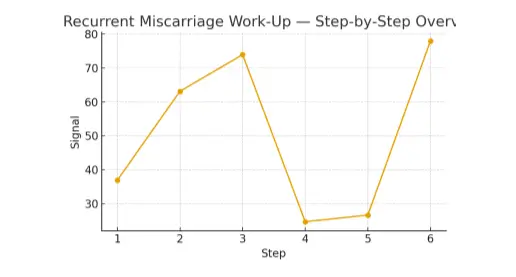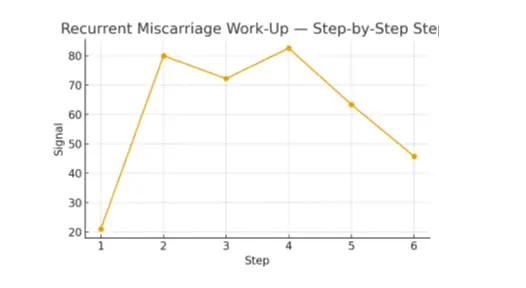
Recurrent miscarriage is emotionally and medically complex. This guide walks through a practical, humane, step-by-step work-up within the Fertility Testing & Diagnostics pathway so patients and clinics can protect timing, reduce unnecessary tests, and make clear decisions. You’ll learn who benefits, when to pause or escalate, realistic costs with line-item examples, and the simple decision rules that keep care focused on outcomes.
1) Definitions and where this fits in the journey
Recurrent miscarriage typically refers to two or more failed clinical pregnancies. The work-up lives at the intersection between initial fertility evaluation and advanced treatment (IVF or donor options). Its purpose is to determine treatable causes (anatomic, endocrine, genetic, immunologic, thrombophilia, infection) and to design a plan that improves the couple’s cumulative live-birth probability while minimizing cost and delay.
Where it fits: after basic infertility screen (semen analysis, ovarian reserve, uterine imaging) but before or in parallel with decisions about IVF, genetic testing, or surgical correction.
2) Eligibility signals and when to escalate or pause
Who benefits from a full work-up:
- Two or more pregnancy losses (or one loss with high-risk features such as late loss or abnormal fetal findings).
- Maternal age ≥35 (timing and genetics considerations).
- Known uterine anomaly, repeated implantation failure, or abnormal karyotypes.
- When to escalate quickly: significant bleeding issues, rapidly changing endocrine labs, or progressive findings on imaging.
- When to pause or defer: if acute illness, unresolved infection, or when the couple requests a time to process emotionally — timing matters as tests are most informative when coordinated with cycle timing and when results will actually change management.
3) Step-by-step with timing checkpoints
- Initial intake and history (Week 0): detailed obstetric, genetic, medication, and family history; prior pathology reports.
- Basic labs (Weeks 0–2): TSH, fasting glucose/HbA1c, prolactin, baseline hormone panel (AMH if not recent). Timing: baseline labs can be done any day except some should be cycle-timed.
- Genetic evaluation (Weeks 1–3): parental karyotypes and review of any products of conception, if available. Karyotyping turnaround is often 2–3 weeks and influences whether to pursue IVF with PGT-A.
- Uterine assessment (Weeks 1–4): transvaginal ultrasound and saline sonohysterography or hysteroscopy if indicated. Corrective surgery timing depends on findings and fertility plans.
- Infectious and immunologic screen (Weeks 2–4): targeted testing (not broad unchecked panels). Only escalate immunologic testing when clinical suspicion or recurrent unexplained losses persist after other causes are ruled out.
- Thrombophilia and endocrine follow-up (Weeks 2–4): targeted thrombophilia testing in context (personal or family history of clotting) — avoid blanket testing.
- Synthesis and shared decision (Weeks 4–6): multidisciplinary review (REI, genetics, nursing) to map treatment: expectant management, targeted medical therapy, surgical correction, IVF±PGT-A. Build the schedule and financing plan.
Checkpoint rule: no irreversible interventions without confirming key results (e.g., karyotype, uterine anatomy).
4) Pros, cons, and practical costs with line-item examples
Pros: focused testing identifies treatable causes, reduces wasted cycles, clarifies prognosis, and helps choose IVF vs expectant care.
Cons: cost, emotional toll, and potential for over-testing. Keep tests purposeful.
Typical cost examples (U.S., NYC area ranges):
- Initial consult + nursing intake: $150–$400
- Basic labs panel (TSH, prolactin, glucose, baseline hormones): $200–$600
- Parental karyotype (each): $400–$900
- Uterine saline sonohysterogram: $300–$800; diagnostic hysteroscopy: $1,500–$4,000 (if operative, higher)
- Targeted thrombophilia panel: $200–$800 (depending on tests)
- PGT-A per embryo (if moving to IVF): $500–$1,500 per embryo (testing lab-dependent)
- IVF cycle (meds, monitoring, retrieval, lab): $12,000–$25,000+ (medication adds $2,000–$6,000)
- These are illustrative; actual costs vary by clinic, insurance, and specific options like anesthesia, genetics counseling, and cryostorage.
5) Outcome drivers you control vs those you monitor
You control: timing of testing and treatment, medication adherence, choice of evidence-based add-ons, clinic logistics (single-lab coordination), and realistic financing plans.
You monitor: Other outcome drivers are primarily observed rather than controlled, including maternal age, embryo aneuploidy risk, uterine healing, and cumulative live-birth rates across cycles. Monitoring frequency should align with interventions that can impact outcomes, such as adjusting stimulation protocols or refining embryo transfer timing. By tracking these fertility metrics within your NYC IVF plan, patients and clinicians can make data-driven adjustments that enhance fertility success rates, improve treatment efficiency, and minimize overall costs across multiple cycles.
6) Questions to ask your clinic
- Which tests will change my treatment plan versus those done “just in case”?
- What is the lab’s turnaround time, and how will delays affect our cycle?
- What are the estimated out-of-pocket costs for each pathway (conservative vs IVF+PGT-A)?
- If we choose IVF, what success rates do you report for patients like me/us?
- Who coordinates logistics (nurse navigator/pharmacy), and how will communications work?
Expert Quote
“Protect timing and keep plans simple—quality improves when noise goes down.”
Patient Case Study (short)
A couple had multiple inconclusive tests and growing frustration. A coordinated work-up prioritized parental karyotypes and a hysteroscopy. Once the anatomical issue was corrected and a clear genetics plan formed, they moved to a single IVF+PGT-A cycle matched to endometrial timing — delivering a predictable path forward and a successful pregnancy.
Testimonials
“The steps finally made sense.” — A.&J., Manhattan
“Costs were clear; no surprise bills.” — L., Hoboken
“Nurses replied fast with practical coaching.” — K.&V., Queens
Next Steps with Surrogacy4All
Free 15-minute nurse consult, upload labs for a second opinion, and Cost breakdown for your case. Lab quality, transparent pharmacy logistics, and clear consent practices materially reduce delays and surprise costs. Small changes — aligning embryo and endometrium timing, selecting evidence-based add-ons, and using transparent pricing — increase predictability. For personalized support and coordinated fertility care in the NYC area, reach out to Surrogacy4All to review your history, get a clear cost breakdown, and map a step-by-step plan that protects timing and reduces noise. Contact us today!
Frequently Asked Questions (FAQs)
Q: How many miscarriages qualify me for further testing versus expectant care?
Ans. Many centers consider two or more clinical losses a threshold for expanded work-up, but individual factors (age, clinical features) can justify earlier testing.
Q: Will IVF with PGT-A guarantee a live birth?
Ans. No test guarantees live birth. PGT-A reduces transfer of aneuploid embryos and can improve per-transfer success rates, but cumulative success depends on embryo yield and maternal factors
Q: What success rates should I expect in NYC clinics?
Ans. Success rates vary by age, diagnosis, and clinic. Ask clinics for age-stratified live-birth per retrieval and per transfer rates for patients with similar profiles.
Q: How do costs stack up between expectant care and IVF?
Ans. Expectant or medical management is generally lower upfront, but repeated losses have emotional and indirect costs. IVF has a higher upfront cost but can be more time-efficient for certain diagnoses.
Q: Does insurance cover a recurrent miscarriage work-up in NYC?
Ans. Coverage varies by plan and state mandates. Many diagnostic tests are partially covered; IVF coverage is limited—verify your plan and request itemized estimates.

Dr. Kulsoom Baloch
Dr. Kulsoom Baloch is a dedicated donor coordinator at Egg Donors, leveraging her extensive background in medicine and public health. She holds an MBBS from Ziauddin University, Pakistan, and an MPH from Hofstra University, New York. With three years of clinical experience at prominent hospitals in Karachi, Pakistan, Dr. Baloch has honed her skills in patient care and medical research.






